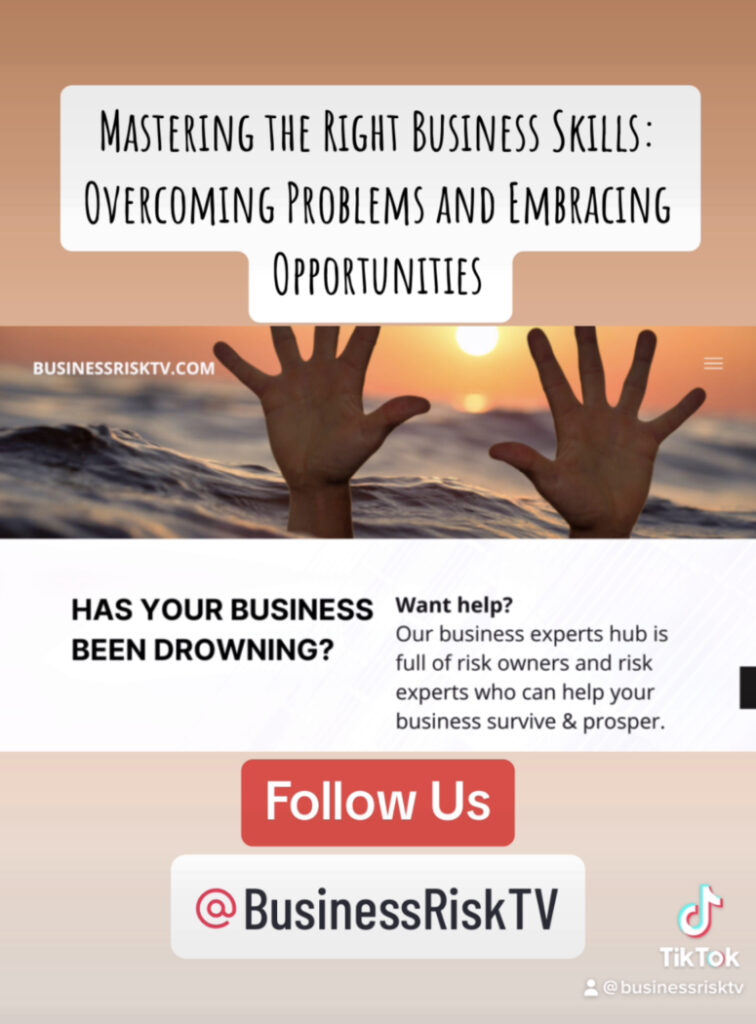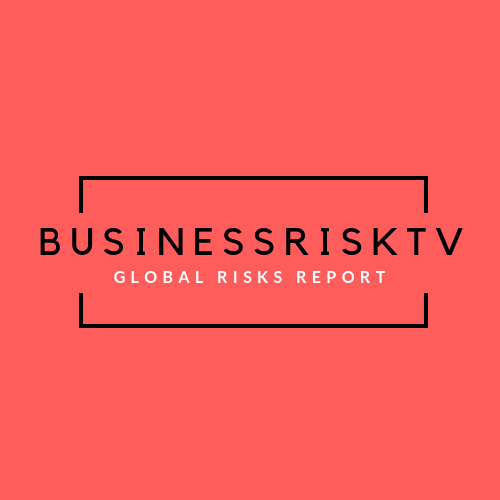Has your business been just surviving for too long and could it be more successful?
There are many ways to grow a business. There is no right way fits all businesses. Even if the business is almost the exact same as another business in terms of who they target to sell to and have the same resources, the success and failure can come down to who leads the business and how they manage limited resources.
The problem can be exacerbated by outside risk events like wars, pandemics and interest rate movements, but controlling both internal and external risk drivers is what a leader is paid to do.
How can you save and grow your business
BusinessRiskTV
Do not let fear of unknown and uncertainty deprive you of a more successful business. We can help you make better business decisions with increased risk knowledge, improved risk management skills and better business intelligence.
Business survival in the current economic climate is an important first base objective. However, attack can be the best form of defence! Growing your way out of the imminent global recession may help you not only survive but prosper.
- Why has your business not grown as fast as you would have liked?
- Do you know?
- Is that the right perception of your failure to grow?
- Do you know what you could do differently?
- Why haven’t you made the changes needed to be more successful in business?
Sure there have been challenges over last few years. Yes you had to react fast to survive. However, getting ahead of the impeding disaster to hit many businesses will help your business survive and grow.
Keys to a successful business
3 things that make a business successful are:
- It solves a problem cost effectively;
- Its business leaders seek to increase profit not turnover;
- Its business leaders engage everyone in the process of being better, regardless of how good they currently are at the way they do things.
Become more tuned to the needs of your business stakeholders. Adapt your offering to the marketplace to dit those needs better. Deliver what they need and want more cost-effectively with less uncertainty. Make money more easily with more certainty with a better business risk management plan. Maximise the value of your business with a better offering to the marketplace.
Mastering the Right Business Skills: Overcoming Problems and Embracing Opportunities
In the dynamic and competitive landscape of the business world, possessing the right set of skills is crucial for running a successful enterprise. Whether you are an entrepreneur starting a new venture or an established business owner, honing your business skills is essential for tackling challenges, solving problems, and capitalising on opportunities. This article explores the key skills needed to run a successful business, highlights the importance of these skills, discusses problem-solving strategies, and provides practical tips for improving your business acumen.
I. The Essential Skills for Running a Successful Business
Running a successful business requires a combination of hard and soft skills. Below are some key skills that entrepreneurs and business owners should develop:
- Leadership and Communication Skills: Effective leadership is vital for guiding teams, making strategic decisions, and inspiring employees. Strong communication skills foster collaboration, negotiation, and relationship building.
- Financial Management Skills: Understanding financial concepts, managing cash flow, and analysing financial statements are crucial for making informed business decisions and ensuring long-term sustainability.
- Marketing and Sales Skills: The ability to identify target markets, develop effective marketing strategies, and close sales is essential for attracting and retaining customers.
- Problem-Solving and Decision-Making Skills: Being able to analyse complex situations, think critically, and make sound decisions in a timely manner is vital for overcoming challenges and seizing opportunities.
- Adaptability and Resilience: The business landscape is constantly evolving, and being adaptable and resilient allows entrepreneurs to navigate uncertainties and bounce back from setbacks.
- Time and Project Management Skills: Effective time management and project planning ensure that tasks are completed efficiently, deadlines are met, and resources are optimised.
- Networking and Relationship Building Skills: Building a strong network of contacts, maintaining customer relationships, and nurturing partnerships are valuable for business growth and opportunities.
II. The Importance of Business Skills
Business skills are fundamental for several reasons:
- Successful Decision Making: With the right business skills, entrepreneurs can analyse data, evaluate risks, and make informed decisions, leading to better outcomes and growth.
- Efficient Problem Solving: Business skills equip individuals with problem-solving techniques to identify and address issues, enabling smoother operations and improved customer satisfaction.
- Adaptation to Changing Markets: Business skills enable entrepreneurs to stay abreast of market trends, identify emerging opportunities, and adapt their strategies to remain competitive.
- Effective Communication: Strong communication skills enhance collaboration, team dynamics, and customer relations, fostering a positive brand image and facilitating business success.
- Building a Strong Team: Business skills contribute to effective team management, recruitment, and employee development, leading to a motivated workforce and higher productivity.
- Financial Management: Proficient financial skills help entrepreneurs manage budgets, cash flow, and profitability, enabling sustainable growth and mitigating financial risks.
III. Solving Business-Related Problems
To solve business problems effectively, consider the following strategies:
- Define the Problem: Clearly identify the problem by analysing the root causes and understanding its impact on various aspects of the business.
- Gather Information: Collect relevant data, conduct research, and consult experts to gain insights and develop a comprehensive understanding of the problem.
- Analyse and Prioritise: Break down the problem into manageable components, evaluate their significance, and prioritise areas for action.
- Generate Solutions: Encourage brainstorming sessions to generate a range of potential solutions. Evaluate each option based on feasibility, cost-effectiveness, and alignment with business objectives.
- Implement and Monitor: Select the most viable solution and create an action plan. Monitor progress, gather feedback, and make necessary adjustments to ensure effective implementation.
IV. Improving Business Skills
Enhancing your business skills is an ongoing process. Here are some practical ways to improve your skills:
- Continuous Learning: Stay updated with industry trends, technologies, and best practices through books, online courses, podcasts, and industry events.
- Seek Mentorship: Engage with experienced professionals who can provide guidance, share insights, and offer support based on their own business experiences.
- Networking Opportunities: Attend business conferences, join professional associations, and actively participate in networking events to expand your connections and learn from others.
- Embrace Feedback: Seek feedback from customers, employees, and mentors to identify areas for improvement and make necessary adjustments.
- Develop Emotional Intelligence: Enhance your ability to understand and manage emotions, build relationships, and communicate effectively.
- Delegate and Empower: Learn to delegate tasks and empower your team members, allowing you to focus on higher-level strategic activities.
- Engage in Critical Thinking: Develop critical thinking skills by analysing complex problems, evaluating multiple perspectives, and making informed decisions.
Mastering the right business skills is a prerequisite for running a successful enterprise. These skills empower entrepreneurs and business owners to overcome challenges, solve problems, and seize opportunities in the dynamic and competitive business landscape. By developing and honing the essential skills discussed in this article, individuals can enhance their decision-making abilities, adapt to changing markets, and build thriving businesses. Continuous learning, seeking mentorship, embracing feedback, and practicing emotional intelligence are practical ways to improve business skills. Remember, the journey to becoming a successful entrepreneur is a continuous one, and investing in your business skills is an investment in your future success.

Promote your business

More business risk management articles videos and risk reviews
Subscribe for free to BusinessRiskTV
Business Tips Of The Day
What makes a company successful over the long term?



